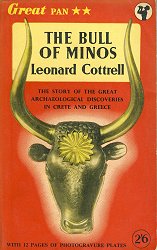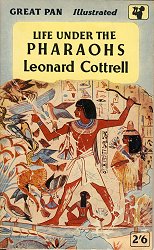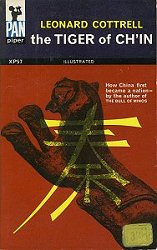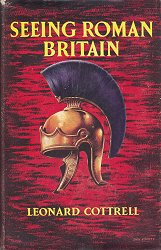LEONARD COTTRELLby Frank SharmanWith thanks to David Clare for drawing attention to this Wulfrunian and providing information and scans. Leonard Cottrell was a prolific author and broadcaster, whose books sold in enormous numbers. Most of them were about archaeology and ancient history and did much to popularise those subjects. But he always pointed out that he was not an archaeologist. In one of his books he explained that archaeologists, especially Egyptologists, were somewhat cloistered people, and he felt it was his role to get these subjects out of the University lecture room and to make them accessible to all. But he would, at the time, have been classified as an “armchair archaeologist” and his books found their way onto the reading lists of University course. And he was a member of the Royal Institute of Archaeology, the Egypt Exploration Society and the Hellenic Society.
His father had fired his interest in history, ancient and modern, and Leonard was one of the many whose imagination had been stirred by the discovery of Tutankhamun’s tomb. On leaving school he wanted to become a journalist but his mother, Beatrice (nee Tootell), objected because he would have had to join a newspaper away from home. So he started life as a copywriter in advertising – though with which firm, and where, is not known but probably in Wolverhampton or Birimingham. He still wanted to be a journalist and like many such aspirants at the time read Dryden, Pope, Addison and Steel and Dr. Johnson, whose works were considered to exhibit a clarity and style that had not been equalled since and were worthy of simulation. He also continued his interest in history and toured the countryside on a motorbike, visiting sites of interest.
After the war he wrote and produced a number of documentaries about great archaeological discoveries. The success of these lead to its being suggested that he should write books about archaeology and this he did, starting with “The Lost Pharoahs”.
Cottrell transferred to BBC Television in 1956 but, oddly, was never allowed to make programmes about archaeology and history: he was put in the drama department. So he left and moved to a house overlooking the estuary of the River Kent in Westmoreland, where he stayed for the rest of his life, writing.
The following is a list of titles of Leonard Cottrell's books. It is probably not complete. It is in random order. To this list could be added numerous newspaper and magazine articles and many radio and television programmes. Many of the books were translated and published in other languages.
|




